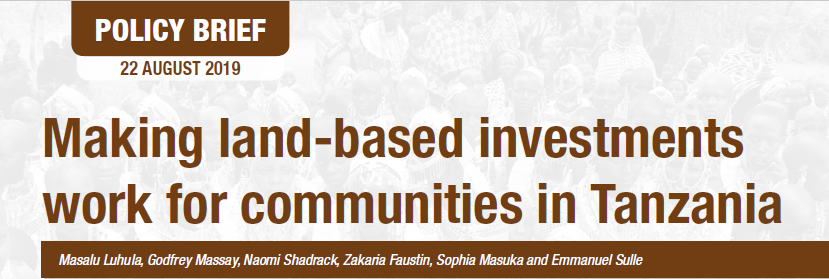CASE STUDY ON APPROACHES FOR SUPPORTING PASTORALISTS GROUPS FACING CLIMATE CHANGE EFFECTS IN TANZANIA
Climate change Study Findings
The Irish Aid Climate Change and Development Learning Platform seeks to build the capacity of Irish Aid staff and partner’s to incorporate climate change into development programming and improve tracking and reporting of climate change activities. The Learning Platform (LP) commissioned IIED to undertake a number of case studies to assess how climate change is being integrated into development planning either by governments or development agencies in those countries in which Irish Aid has programmes. Pastoralists Programme implemented by TNRF in partnership with CARE, Promoting adaptation and climate resilience growth through devolved district climate finance (IIED/Haki Kazi Catalyst), and Pastoralism Programme(OXFAM) all funded by Irish were selected in this case study.
The aim of the study was to identify, generate and share the learning drawn from 3 case study approaches to supporting pastoralist groups in Tanzania, and to identify strengths of approaches and support to local adaptation in the drylands.
The field work for data collection was carried out from 10Th -22nd June 2015, leaded by Sam Greene , Consultant, IIED; assisted by Zakaria Faustin – TNRF Pastoralists Programme Manager, Marcely Madubi – Care Pastoralist Program Coordinator, and Julian Dalika – Care Pastoralist Program M+E Officer. The studies consisted of an appreciative enquiry into approaches for supporting pastoralist groups facing Climate change effects in Tanzania. Other tools used were TAMD and Climate Resilience Spectrum. The study was conducted guided by the following key guiding questions:
- How far did benefits achieved match the planned Theories of Change?
- What were the most effective ways of achieving benefits?
- How well was climate change integrated into planning?
- What was most effective at driving this change?
- To what extent could adaptations and changes be considered “radical” or transformational?
Some of the lessons learnt from the study included the Tools, Strategies and Approaches that have been particularly effective from the 3 programmes funded by Irish Aid - Pastoralists Programme (Care and TNRF), Promoting adaptation and climate resilience growth through devolved district climate finance (IIED/Haki Kazi Catalyst), and Pastoralism Programme (OXFAM):
- Perception Change (through trainings on climate change, pastoralism, land rights, gender and governance to all stakeholders along decision making organs) was highly valued by participants as a route towards creating an enabling environment.
- The role of CSOs’ at community level are viewed as trusted bodies for providing trainings with access to the district council on the sense that CSO’s can bridge the gap between district councils, village governments and communities.
- Resource Mapping was identified as a powerful tool to both explain the rational of pastoralist planning and resource use and support Land use planning. It busts myth of destructive, unplanned resource use.
- It was found that land Use planning should go beyond the village and more powerful if backed by legal titling. However, it was discussed in the validation workshop that there is a risk these legal titling agreements can be nullified by political pressure.
- The use of a more appropriate spatial unit of planning was discussed as effective way to enable customary planning processes. The division planning at divisional level/joint land use plans addresses the challenges of too much power in the village authority that may lead to sales of land within village land.
- The validation workshop found that communities are very ready to adapt – are aware of the problems and very willing to change. Some of them discussed were the speed of change in village assemblies and decision making demonstrates this readiness.
- The Village Assembly was discussed as a key community decision making body to influence gender rights. Notable power of gender rights awareness was discussed
- A balance of customary and formal aspects was discussed as very effective through combination of customary and formal, legal processes on the finding the rights balance contrary the law alone that can be undermined the communities’ interests.
- The discussion found that the use of already exists legal frameworks as advocacy tools was one of the driving force for projects advantage on women rights, eg Village Land Act 1999 and exists women’s rights enshrined in law, and in proposed Constitutional review.
- The workshop discussed that improved Climate Risk Management comes through the district level is slower, and faster resilience building from the community level, but is more likely to be “incremental”.
- Broad participation through Dialogue and meaningful participation from the beginning (either advocacy or project design, found as a powerful approach) in success and influencing adaptation strategies and resources access.
- The human rights based approaches on lobbying and advocacy on pastoralism was discussed as an effective through Movement toward institutional integration at national level through advocacy on focusing on issues that matter to government - climate change, governance, gender, resources and Enhanced communication among Civil Society and with government
- Strategic Advocacy using key moments by appealing to government interests was found as effective way of influence government to change policies and address communities’ adaptation interests; ie Advocacy initiatives during Conference of parties, parliamentary sessions, constitutional review meetings and linked with to ongoing regional and international engagements like East Africa Community, Africa Union Framework on the rights of indigenous, etc.
More specific findings on land, gender, advocacy and climate risk management can be accessed here…
The study is still investigating further long term consequences of successes gained, threats exist that may undermine the benefits gained from different projects, and challenges that were overcome during the implementation process and how were they overcome.

